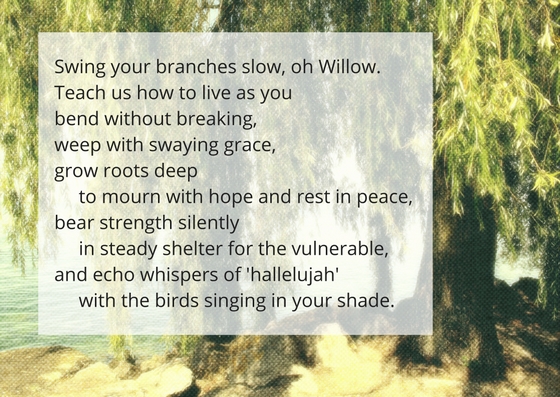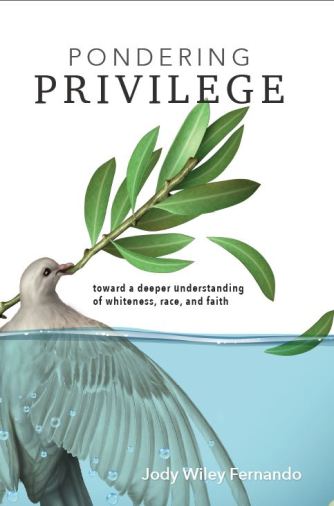
It was the summer of 2001, and we had just returned from our first trip as a married couple to my husband’s home country of Sri Lanka. Sri Lanka was in the midst of a brutal civil war, and suicide bombings were a frequent tactic of the terrorist group seeking their own homeland in the north part of the country. Two days after we flew out of the country, the terrorists attacked the airport, destroying 3 airplanes and closing the airport for 14 hours. Out of the seven evenings that week, a member of my husband’s family was scheduled to fly in or out every night except for the day of the attack. We had narrowly escaped tragedy.
Because of our desire at the time to return to Sri Lanka to live and work, I had been praying for months that God would help me learn what it might mean to live in a country at war. When the terrorist attack hit so close to my family, my first response was, “Not like this, Lord. My family? This is too close to home.”
Less than two month later, 9/11 shook the nation. We lived near Washington DC at the time, so close to the Pentagon that the windows of our apartment shook when the plane crashed into it. As the day progressed and we learned more details of the attack, I remembered my request that God would teach me what it might mean to live in a war-torn country. “But not like this, Lord,” I remembered pleading. “Please—not so close to home.”
In the midst of my pleas for safety, I was forced to reconcile the fact that not everyone had the privilege to be “introduced” to life-threatening danger. Many around the world had lived in the midst of a warzone for their entire lives. While friends in Sri Lanka reminisced fondly about the “sweet times together as a family” hiding under the dining room table during bombings, I would shake my head with amazement that they found light in the midst of such deep darkness.
Over the course of our 20-year interracial relationship, I have held growing anxiety within about racial tensions in our country. I’ve anticipated explosive race wars for most of my adult life, and each headline of their growing intensity deepens the ache inside me for the future of my children. As I watched the White Nationalist rallies in Charlottesville last weekend, my prayer resurged once again, “Not like this, Lord.”
Indeed, we live in tumultuous times, but these are still the times God given us. The question is how we will live in them. Friends of color express increasing levels of stress and trauma while some white friends are just beginning to grasp that the unrest expressed in the civil rights movement that has been simmering for decades, that our country is nowhere near being “over this yet”. The Message’s version of Romans 12 offers guidance on how to place our lives before God in times of such weariness and tumult:
Culture-blindness
So here’s what I want you to do, God helping you: Take your everyday, ordinary life—your sleeping, eating, going-to-work, and walking-around life—and place it before God as an offering. Embracing what God does for you is the best thing you can do for him. Don’t become so well-adjusted to your culture that you fit into it without even thinking. (v1)
While some white people understand that expressing color-blindness is dismissive and patronizing to people of color, it’s harder for us to see how ‘well-adjusted’ we are to our own white culture. What do we speak about when we describe “the best” music, food, authors, TV shows, Christian figures? Do we notice when preferences we express as “normal” are really just normal to a white mainstream standard? Now is not a time to kick back and continue on as normal. We must ask difficult questions of both ourselves, our churches, and our culture.
Counter-cultural maturity
Instead, fix your attention on God. You’ll be changed from the inside out. Readily recognize what he wants from you, and quickly respond to it. Unlike the culture around you, always dragging you down to its level of immaturity, God brings the best out of you, develops well-formed maturity in you. (v2)
Rather than knee-jerk defense of a specific politic, Christ followers need to pursue maturity that demonstrates values like love, joy, peace, patience, gentleness, goodness, kindness, and self-control. This does not necessarily mean we keep our opinions private, but rather that our actions and words are continually seasoned and influenced by these things when we do share or act.
Humble focus
If you preach, just preach God’s Message, nothing else; if you help, just help, don’t take over; if you teach, stick to your teaching; if you give encouraging guidance, be careful that you don’t get bossy; if you’re put in charge, don’t manipulate; if you’re called to give aid to people in distress, keep your eyes open and be quick to respond; if you work with the disadvantaged, don’t let yourself get irritated with them or depressed by them. Keep a smile on your face. (v6-8)
In a world where words are flung back and forth at each other like bombs, modeling humble and focused behavior stems from a steady and mature relationship with God. It means praying our way both through difficult headlines as well as through the stubborn and prideful attitudes we uncover in our own hearts. It could mean speaking truth in uncomfortable ways or listening to perspectives we have not considered before.
Deep friendship
Love from the center of who you are; don’t fake it. Run for dear life from evil; hold on for dear life to good. Be good friends who love deeply; practice playing second fiddle. (v9-10)
Now is the time extend a hand, to check-in with a friend, to pray fervently against the evil that unsettles our souls. For some, loving deeply may mean setting aside our own understanding so that we can listen to others’ pain while for others, it may mean fighting fiercely to protect and defend the injustices happening in their own communities.
Perseverant compassion
Don’t burn out; keep yourselves fueled and aflame. Be alert servants of the Master, cheerfully expectant. Don’t quit in hard times; pray all the harder. Help needy Christians; be inventive in hospitality.
Bless your enemies; no cursing under your breath. Laugh with your happy friends when they’re happy; share tears when they’re down. Get along with each other; don’t be stuck-up. Make friends with nobodies; don’t be the great somebody.
Don’t hit back; discover beauty in everyone. If you’ve got it in you, get along with everybody. Don’t insist on getting even; that’s not for you to do. “I’ll do the judging,” says God. “I’ll take care of it.” (v11-19)
Paul focuses on compassion for both ourselves as well as our enemies. “Don’t burn out,” he warns in tandem with “bless your enemies” and “laugh with your friends”. Profit-driven headlines fuel the temptation toward constant anger, and if we are to provide a counter narrative to the story of hate being consistently told, we cannot let the headlines dictate this story for our lives as well. This means stepping away at times to laugh with friends so that we have energy left to not curse our enemies, to not hit back, and to remember that there is beauty in everyone.
















